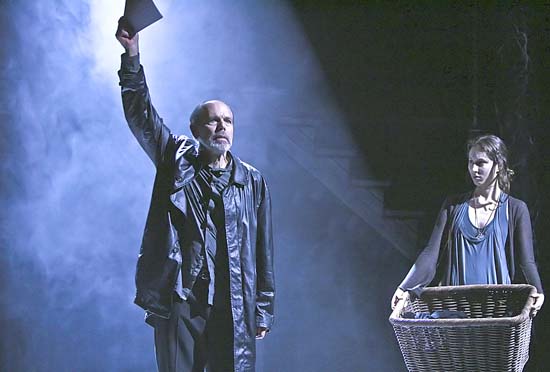While listening to a story, watching a movie or reading a history book, it’s always important to consider the storyteller and what his or her perspective is ““ the great playwright William Shakespeare is no exception.
“Equivocation,” a new play at the Geffen Playhouse, wrestles with this issue of perspective as it relays the tale of Shakespeare’s commission to write a play of government propaganda about the Gunpowder Plot, the conspiracy to blow up Parliament in 1605.
“History was for a long time told just by men, and what was different from the norm had to be exterminated,” said Troian Bellisario, who plays Shakespeare’s daughter Judith. “As the female and as his daughter, I represent a different type of storytelling that I’m trying to get my father interested in.”
In the play, the story that the government wants told turns out to have a lot of holes, which Shakespeare finds out as he investigates the plot. He must then decide which version of the facts to tell and face retribution from the government if he tells the truth. With “Equivocation,” playwright Bill Cain emphasizes the modern relevance of such a dilemma.
“What would happen if Shakespeare were alive today and in the same position? If he was writing the official version of what happened with weapons of mass destruction?” Cain said. “Would he investigate and find the truth, or would he give us the government’s story?”
Most people have seen or read Shakespeare’s plays in high school or college, and it could be easy to think of stories like Macbeth and Hamlet, with murder plots and royal families, as completely removed from the experiences of today.
“”˜Equivocation’ shows us that these concerns are not all that distant, and the things he wrote about, the themes he treated, the concerns he had in his life and in his society are as active now as they were back then,” said Joe Spano, who plays Shakespeare. “It doesn’t pay too much attention to period authenticity ““ more important are the themes of the play and the action rather than making it a historical museum piece.”
Updating the play to its modern context was done after “Equivocation” was performed at the Oregon Shakespeare Festival in Ashland. Despite its success there, Cain and director David Esbjornson decided that changes were necessary for its production at the Geffen.
“In Ashland, it was done in a historical context. (At the Geffen), we’re blending that with a modern sensibility. Cain’s perspective as a writer is a modern one, so we thought it might be interesting to focus the production in the fact that it’s a modern play reaching backward,” Esbjornson said.
While being written in modern English may make “Equivocation” easier to follow, there are plenty of ways in which this complex story will keep the audience ““ and the cast and crew ““ on their toes.
“It needs a tremendous amount of planning to pull it off,” Esbjornson said. “There are four story lines all going at the same time, so lots of actor transformations and scenic transformations that have to occur instantaneously. So that’s all pretty challenging to accomplish in a five-week rehearsal schedule.”
For Spano, the struggle lies not in playing such an enigmatic character, but in being able to follow the complications of Cain’s creation.
“It’s a very large play, so the difficulty is plotting the course through this very theatrical maze,” Spano said.
Luckily, for any students not majoring in English, it doesn’t take an in-depth knowledge of Shakespeare to understand “Equivocation.”
“It’s not going to lay out everything for you; it’s one of those plays that makes the audience work to stay with it,” Bellisario said. “But it’s very rewarding and it makes you want to stay with it.”
Though equivocal language is known to be deceptive and misleading, the goal of “Equivocation” is not to trick its audience.
“Equivocation is defined in the play as the ability to tell the truth in difficult times, and the ultimate truth is that we live together on this planet and we share for a while the extraordinary fact that we are,” Cain said.
